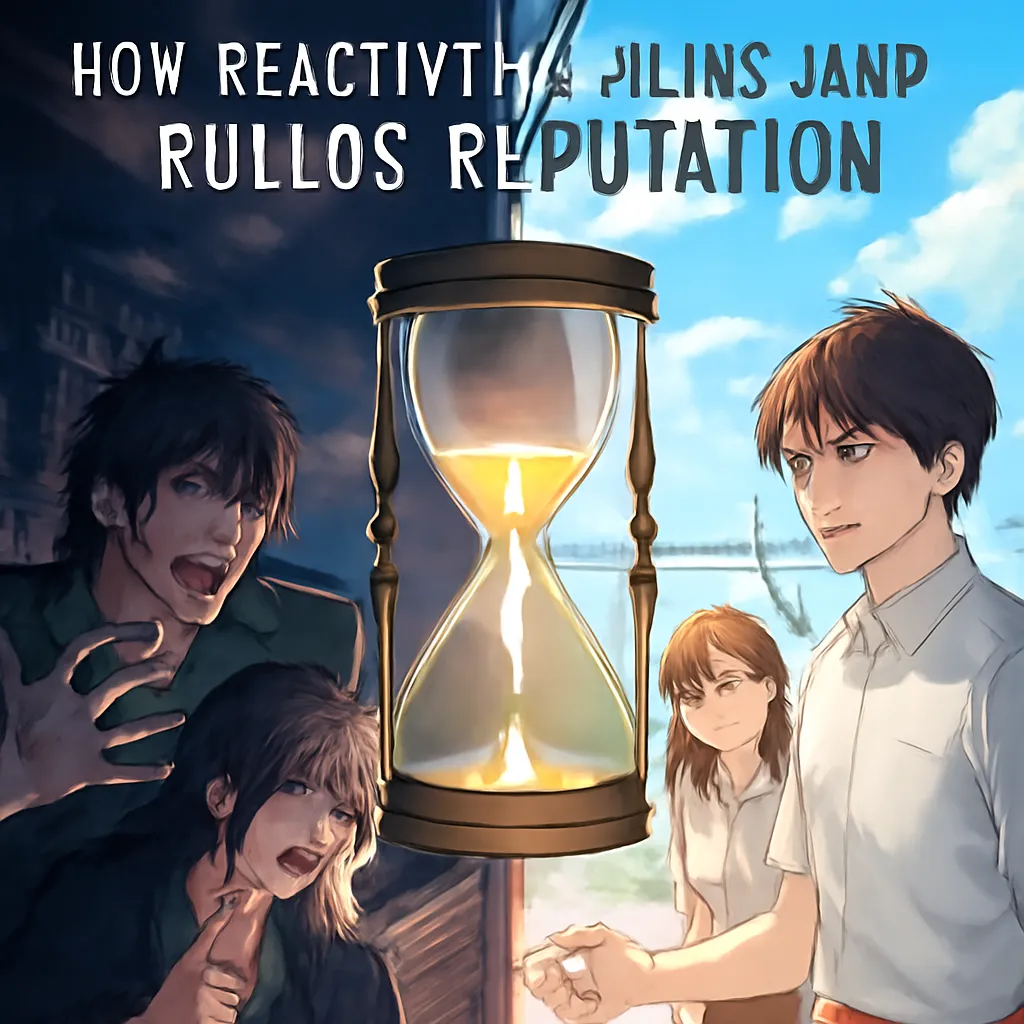Have you ever felt like your emotions are running the show—and you’re just trapped in the audience? Years ago, at a family reunion, I blurted something out in a heated debate, only to spend the rest of the evening wishing I’d just stuck to eating my pie. Emotional outbursts: they’re messy, memorable, and, as a wise doctor once said, can destroy what took years to build. Today, we get real about what it takes to hold onto self-control when it matters most—and why sometimes the greatest strength is the one nobody notices.
1. The One-Second Rule: How Reactivity Ruins (and Builds) Reputation
Imagine this: you’ve spent years building respect and reputation at work, in your community, or even within your family. Then, in a single heated moment, you say something you regret—or fire off an angry email—and suddenly, everything changes. Dr. Levy’s words echo in your mind:
“You can do a hundred things right but it takes only one thoughtless reactive action to destroy it all.”
That sting of regret isn’t just personal—it’s universal. Research shows that maintaining composure and managing emotional responses are crucial for building respect and a positive reputation. Life, as the saying goes, is ten percent what happens to you and ninety percent how you react. People rarely remember the details of a situation, but they never forget your reaction.
Let’s be honest: you can’t control how others treat you, the outcome of a job interview, or the random curveballs life throws your way. What you can control is your reaction. This is where emotional regulation skills become your secret weapon. They’re not just about “staying calm”—they’re about shaping your legacy, moment by moment.
Think about a friend or colleague who lost job opportunities because of a single impulsive outburst. Maybe it was an angry email sent in the heat of the moment, or a careless comment in a meeting. The consequences of impulsive actions can be severe and long-lasting. Building respect and reputation is a slow process, but losing it can happen in seconds.
You’ll meet people—at school, in the office, even at home—who seem to thrive on pushing your buttons. Sometimes, it feels like they’re just waiting for you to snap. The truth is, when you let others control your emotional state, you hand them the power over your actions and, ultimately, your reputation. The classic Coca Cola can metaphor comes to mind: if you let yourself get shaken by negativity, you risk erupting in ways you’ll regret.
So, how do you practice emotional self-regulation? Mindfulness and cognitive reappraisal are powerful tools. When you pause, breathe, and reflect—even for just one second—you give yourself the space to choose your response. As Hemingway put it, “Before you act, listen. Before you react, think.” That one-second pause can mean the difference between building your legacy or damaging it.
Successful people understand the value of focus power. They don’t waste energy on distractions or negativity. Instead, they protect their time, their energy, and their reputation by responding thoughtfully, not impulsively. They know that emotional self-regulation isn’t just a skill—it’s the foundation of long-term success and respect.

2. Surrender to Chaos—But Master Your Mind Like a Ninja
Let’s get real for a second: you can’t control people, traffic, or the weather. No matter how hard you try, there will always be things (and people) that slip right through your fingers. Maybe you’ve already noticed this. Maybe you’ve tried to change someone’s mind in a heated debate, or wished you could rewrite the results of a job exam. Spoiler alert: it doesn’t work. As the saying goes, “There will always be people who are out of your control. There will always be situations that are out of your control.”
So, what’s left? Yourself. That’s where self-regulation strategies come into play. When you focus on self-awareness development, you start to realize that your true power lies in how you respond, not in what happens around you. In fact, research shows that practicing mindfulness helps you stay present, reduce negative emotions, and improve your focus and composure—even when the world around you feels like it’s on fire.
Let’s paint a picture: Imagine being the only Zen person in a fiery online comment thread. Everyone else is losing their cool, typing in ALL CAPS, and you? You’re breathing, reading, and choosing not to react. That’s not weakness. That’s ninja-level emotional regulation. You’re not just managing emotional responses—you’re mastering them.
It sounds simple, but it’s not always easy. When chaos hits—missed buses, rude coworkers, or a sudden downpour on your only good hair day—your first instinct might be to react. To snap back, complain, or spiral into frustration. But here’s the wild card: choosing not to react gives you the upper hand. You’re not letting external chaos dictate your internal state. You’re reclaiming your energy for what actually matters.
Developing emotional awareness, especially in wild, uncontrollable settings, is the secret sauce to self-mastery. The more you practice, the more you realize that letting go of external control frees up mental space. You stop wasting energy on things you can’t change, and start investing it in things you can—like your mindset, your reactions, and your growth.
Studies indicate that emotional regulation strategies like mindfulness and cognitive reappraisal are game-changers. They help you pause, notice your feelings, and choose your next move—rather than letting your emotions run the show. You become less impulsive, less likely to be manipulated by others, and more respected in both personal and professional settings.
There will always be people who are out of your control. There will always be situations that are out of your control.
So next time you’re caught in a storm—literal or metaphorical—remember: you can’t control the weather, but you can always control your umbrella. That’s the heart of self-awareness development and emotional self-regulation. And honestly? That’s how you start to win, even when chaos reigns.
3. Emotional Sabotage: Don’t Be the Coke Can (or the Bait)
Ever notice how some people seem to push your buttons just to see what happens? Whether it’s a rival at work, a so-called friend, or even a random critic online, there are always folks out there who thrive on your emotional reactions. Sometimes, it’s not even personal—they just know that if they can get you to lose your cool, they gain the upper hand. This is where avoiding manipulation and maintaining composure become your secret weapons.
Let’s break it down with a simple analogy: imagine you’re a can of Coke. If someone shakes you up and then pops the lid, what happens? You explode. It’s messy, loud, and impossible to contain. That’s exactly what happens when you let your emotions take over in a heated moment. As one wise voice put it,
"They can't sack you up like a coca cola can and you just react like this. Most people do that."
But here’s the thing—most people do react like that. And that’s why critics, enemies, or even frenemies keep shaking the can. They want you to burst, to reveal your secrets, your plans, or even just to say something you’ll regret. When you lose it in front of rivals, you’re basically handing them a sneak peek at your vulnerabilities. Suddenly, your impulsive actions have consequences that go far beyond the moment. Research shows that strong emotional self-mastery is key to professional emotional management and helps you sidestep these traps.
So, what’s the alternative? Picture yourself handling criticism or provocation by mentally ‘unscrewing the cap slowly’ instead of popping it off. Take a breath. Pause. Let the fizz settle. This simple visualization can help you preserve your composure, even when you feel like you’re about to blow. Studies indicate that mindfulness and cognitive reappraisal—basically, learning to pause and reframe your thoughts—are powerful tools for avoiding impulsive actions and keeping your cool under pressure.
It’s not just about looking calm on the outside, either. When you react less, you actually give yourself time to think. You don’t accidentally spill your secrets or reveal your next move. You don’t let someone else’s opinion define your attitude or dictate your destiny. You choose your own response, and that’s real power. In fact, reflecting on past emotional outbursts can help you spot patterns and make better choices next time.
Remember, your words are powerful. One angry outburst can damage relationships, reputations, or even your own peace of mind. So next time someone tries to shake your can, don’t give them the satisfaction. Absorb, breathe, and respond with intention. That’s how you win the battle—by not playing their game.

4. Pause, Absorb, Reflect: The Superpower of Silence (and Five Habits of the Calm)
Imagine this: someone’s shouting at you, maybe even pointing out your mistakes in front of everyone. Your first instinct? React. Defend yourself. Maybe even snap back. But what if you didn’t? What if you just paused, stayed silent, and let the moment pass? Practicing silence isn’t passive—it’s self-protection and stealth. It’s a strategy that’s at the heart of emotional self-regulation importance and one of the most underrated mindfulness practices you can master.
Let’s be honest, silence feels awkward. It can make you squirm, especially when everyone else is losing their cool. I still remember that one family dinner—everyone arguing about politics, voices rising, forks clattering. Me? I just kept eating my peas and smiling. It felt weird, but it also felt powerful. Sometimes, not reacting is the ultimate power move.
"Before you act, listen. Before you react, think." — Ernest Hemingway
Hemingway’s advice is classic for a reason. When you pause before you pop, you give yourself a chance to absorb what’s really happening. You reflect, instead of just reacting. Research shows that reflecting on emotional outbursts from your past—those moments you wish you could take back—can help you choose better, calmer responses in the future. It’s all about learning from your own history and using that knowledge to build stronger strategies for composure.
The Five Non-Reactive Commandments: Habits of the Calm
So, why do successful people seem so unflappable? Here are five habits—the “Non-Reactive Commandments”—that help them stay cool under pressure:
- Keep Your Focus Power: They don’t let distractions or criticism pull them off course. Staying focused is a form of self-respect.
- Save Energy and Time: Every reaction costs you. Mindfulness practices help conserve your energy for what really matters.
- Don’t Reveal Your Secrets: Silence keeps your cards close. You don’t have to share every thought or emotion.
- Control Yourself, Not Others: You can’t change how people treat you, but you can always choose your response. That’s true self-mastery.
- Don’t Hurt Relationships: Words spoken in anger can scar relationships for years. Reflecting before you speak protects those bonds.
It’s not about suppressing your feelings—research indicates that emotional suppression can actually backfire. Instead, it’s about pausing, absorbing, and reflecting. These strategies for composure help you respond with intention, not impulse. The next time you feel the urge to react, remember: silence is your superpower. It’s not weakness. It’s wisdom.
5. Real-World Reality Check: Adaptation (The Preschool Teacher Story)
Let’s be honest—no matter how hard you try, you can’t control everything. You know this already, but it hits differently when you’re in the thick of it. Teachers, parents, managers—everyone faces moments where the world just won’t bend to their will. That’s where the real lesson in self-regulation strategies begins.
Take the story of a preschool teacher, stepping into her first year with big plans and even bigger dreams. She mapped out every lesson, arranged her classroom just so, and practiced her communication with students, parents, and colleagues. But reality? It had other ideas. A child’s mood could swing wildly, parents might not cooperate, and administrative decisions could drop out of nowhere. No matter how much she prepped, some things were simply out of her hands.
At first, frustration crept in. She felt herself getting irritated, her energy zapped by things she couldn’t change. But here’s the twist—she didn’t let that frustration follow her home. Imagine if she had: snapping at her husband, dampening her children’s moods, letting the stress snowball until it wrecked her own peace. It’s a familiar trap, isn’t it?
Instead, she made a conscious pivot. She started practicing mindfulness and self-reflection, asking herself: What’s really in my control? What’s not? She learned to focus her energy on what she could influence—her lesson plans, her classroom environment, her own responses. The rest? She let it slide. This simple shift wasn’t just about surviving the school day; it was about protecting her well-being and her family’s sanity.
Research shows that self-regulation skills are a cornerstone of long-term success self-mastery. When you distinguish between what’s actionable and what’s not, you save your energy for what matters. You stop wasting time reacting to every little thing, and instead, you adapt. That’s the heart of professional emotional management—knowing when to act, when to let go, and how to keep your composure even when chaos reigns.
- Not everything is in your hands. Accepting this is a superpower.
- Control what you can—your plans, your attitude, your actions.
- Let the rest roll off your shoulders. It’s not giving up; it’s getting smart.
- Don’t take stress home. Protect your peace, and your relationships will thank you.
Studies indicate that mindfulness and cognitive reappraisal—reframing your thoughts—are powerful tools for emotional regulation. By reflecting on what you can change and letting go of the rest, you build resilience. You become the kind of person who adapts, who thrives, and who wins more by reacting less.

Conclusion: Not Reacting Is the Boldest Move—Here’s How to Make It Instinctive
Let’s be honest: reacting is easy. It’s almost automatic. Someone throws shade, you want to throw it right back. But here’s the twist—real strength isn’t in the comeback, it’s in the pause. Mastering self-regulation for adults isn’t about being passive or indifferent. It’s about choosing your moment, and sometimes, choosing not to respond at all. That’s not apathy. That’s power and presence, rolled into one.
Think about the most respected people you know—at work, in your family, or even online. They rarely get dragged into drama. Instead, they pause, reflect, and own their responses. They understand that every reaction is a choice. And that choice? It shapes your reputation, your focus, and your happiness. Research shows that emotional regulation strategies are crucial in professional settings, where maintaining composure can make or break relationships and opportunities. When you manage your emotions, you’re not just keeping the peace—you’re building trust and respect.
It’s tempting to believe that not reacting means letting others win. But the opposite is true. When you resist the urge to clap back, you’re actually taking control. You’re not letting someone else’s words or actions dictate your mood or your next move. That’s emotional self-regulation in action. And over time, it becomes instinctive. The more you practice pausing and reflecting—maybe counting to ten, maybe taking a deep breath—the easier it gets. You start to notice the shift: first, it’s subtle. Then, suddenly, you’re the calmest person in the room.
Imagine a world where viral tweets weren’t about the latest celebrity feud, but about who didn’t take the bait. Who stayed silent, kept their cool, and moved on with grace? That’s the kind of influence that lasts. Because, as studies indicate, positive emotional outcomes are built in those unspoken moments. Your ability to regulate your emotions doesn’t just protect your peace—it inspires others to do the same.
Remember, the power of not reacting is the ultimate power. It’s a superpower you can use in every area of your life—at work, at home, online, and in your own mind. Start small. Implement the five calm habits you’ve learned. Celebrate each moment you choose presence over impulse. Over time, you’ll see the change. Your world will shift—slowly, then suddenly. And you’ll realize: the boldest move you can make is sometimes the one you don’t make at all.




